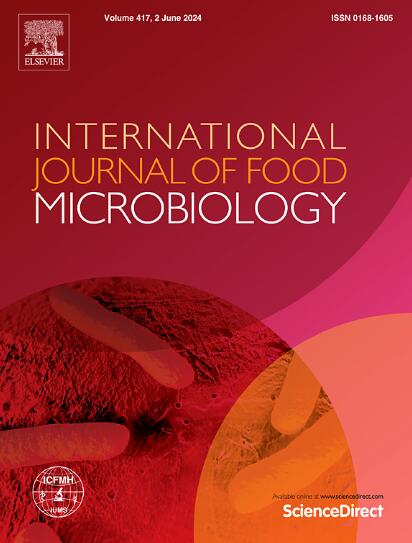Assessment of spoilage microbial communities in modified atmosphere-packed ready-to-eat salad during cold storage: A comparative study using MALDI-TOF MS identification and PacBio full-length 16S rRNA and ITS sequencing
IF 5.2
1区 农林科学
Q1 FOOD SCIENCE & TECHNOLOGY
International journal of food microbiology
Pub Date : 2025-05-14
DOI:10.1016/j.ijfoodmicro.2025.111268
引用次数: 0
Abstract
Effect of storage temperatures and modified atmosphere packaging (MAP) on the shelf-life and spoilage microbial dynamics of industrially produced mayonnaise-based potato salad was studied over two years (Spring 2021, Autumn 2021, Spring 2022). Three salad batches, stored at chilling and abuse temperatures ranging from 0 °C to 12 °C, were analyzed. Microbial communities were evaluated using ISO-standard microbiological methods, MALDI-TOF MS identification, and PacBio full-length 16S rRNA gene and fungal ITS amplicon sequencing. The results showed that sensory and microbiological quality strongly depended on storage temperature, MAP packaging, and salad batch. The recommended upper temperature limit of 6 °C did not preserve salad quality at the end of its shelf-life, while storage below 4 °C extended the seven-day shelf-life to 10 days. Distinct spoilage communities were identified across batches, dominated by Dellaglioa algida, Leuconostoc carnosum, and Latilactobacillus sakei (Spring 2021); Leuconostoc inhae and Leuconostoc gelidum (Autumn 2021); and Lactococcus carnosus (Spring 2022). The microbial communities of ingredients and processing facilities influenced salad microbiota. Comparative analysis showed that full-length 16S rRNA sequencing provided higher resolution, detecting species missed by culturing methods, including psychrotrophic and fastidious lactic acid bacteria. However, fungal community analysis, using full-length ITS amplicons, requires the selection of specific fungal primers. This study provides a comprehensive evaluation of microbial profiles in RTE salads under different storage conditions, highlighting the critical role of temperature and microbial management in preserving MAP salad safety and quality during extended shelf-life.
利用MALDI-TOF质谱鉴定和PacBio全长度16S rRNA及ITS测序对冷库中变质微生物群落的评价
在为期两年(2021年春季、2021年秋季、2022年春季)的研究中,研究了储存温度和气调包装(MAP)对工业生产的蛋黄酱马铃薯沙拉的保质期和腐败微生物动力学的影响。在0 ~ 12℃的冷却温度和滥用温度下,对三批沙拉进行了分析。采用iso标准微生物学方法、MALDI-TOF质谱鉴定、PacBio全长16S rRNA基因和真菌ITS扩增子测序对微生物群落进行评估。结果表明,黄瓜的感官品质和微生物品质与贮藏温度、MAP包装和沙拉批次有很大关系。建议的温度上限6°C并不能在保质期结束时保持沙拉的品质,而低于4°C的储存将7天的保质期延长到10天。在不同批次中发现了不同的腐败菌群,以海藻藻(Dellaglioa algida)、肉芽孢杆菌(Leuconostoc carnosum)和酒井乳酸杆菌(Latilactobacillus sakei)为主(Spring 2021);白蜡树和白蜡树(2021年秋季);和肉乳球菌(2022年春季)。原料和加工设备的微生物群落对沙拉微生物群有影响。对比分析表明,全长16S rRNA测序具有更高的分辨率,可以检测到培养方法遗漏的物种,包括精神萎缩性和挑剔性乳酸菌。然而,真菌群落分析,使用全长ITS扩增子,需要选择特定的真菌引物。本研究全面评价了不同储存条件下RTE沙拉中的微生物特征,强调了温度和微生物管理在延长MAP沙拉保质期中保持安全和质量的关键作用。
本文章由计算机程序翻译,如有差异,请以英文原文为准。
求助全文
约1分钟内获得全文
求助全文
来源期刊
CiteScore
10.40
自引率
5.60%
发文量
322
审稿时长
65 days
期刊介绍:
The International Journal of Food Microbiology publishes papers dealing with all aspects of food microbiology. Articles must present information that is novel, has high impact and interest, and is of high scientific quality. They should provide scientific or technological advancement in the specific field of interest of the journal and enhance its strong international reputation. Preliminary or confirmatory results as well as contributions not strictly related to food microbiology will not be considered for publication.

 求助内容:
求助内容: 应助结果提醒方式:
应助结果提醒方式:


